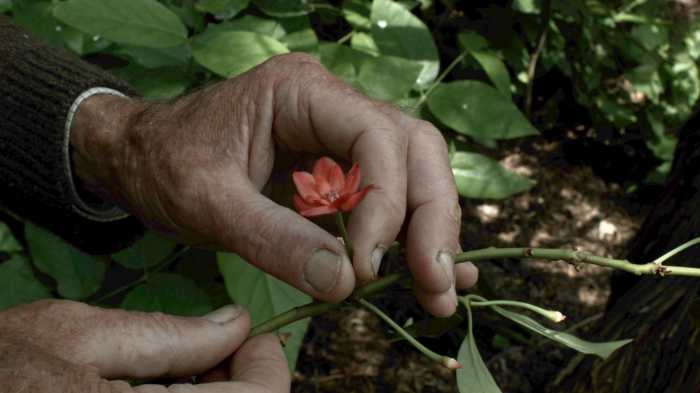Toni Servillo in Paolo Sorrentino’s “The Great Beauty.” | GIANNI FIORITO
Italian director Paolo Sorrentino doesn’t make films that are easy to warm up to. My favorite Sorrentino film, 2011’s “This Must Be the Place,” had me convinced it was a put-on for its first half hour. What else to make of a film about a Goth rocker, played by Sean Penn and obviously modeled on the Cure’s singer Robert Smith, turned Nazi hunter?
Sorrentino’s films, however, have the courage of their convictions, strange as they might be, and “This Must Be the Place” eventually turns into a more imaginative Jewish revenge fantasy than Quentin Tarantino’s “Inglourious Basterds.” The problem with his new film, “The Great Beauty,” isn’t gratuitous weirdness or incongruities like asking us to take a 104-year-old nun’s inane babble as spiritual wisdom. It’s that so much of this weirdness is second-hand.
After writing one novel in his 20s, Jep Gambardella (Toni Servillo) found his creative well running dry and turned to journalism to earn a living. For 40 years, he has also specialized in being the king of Rome’s party scene, as he puts it. In fact, the film opens with his 65th birthday party, an event for which the word “lavish” was invented. His first lover’s husband lets Jep know that he’s read her diaries and that she professed her undying love for him. This information yanks Jep out of his complacent fog and he becomes involved with stripper Ramona (Sabrina Ferilli), whose father is a friend.
Paolo Sorrentino remains one of Fellini’s faithful children
Sorrentino has long been compared to Federico Fellini. Rather than trying to run from this, he embraces it with “The Great Beauty.” Its first 20 minutes’ round of crane shots over Rome and extravagant parties dares you not to compare it to “La Dolce Vita.” Sorrentino recapitulates much of Fellini’s excess, filling his film with camera curlicues and virtuoso dolly shots. He does know when his material calls for a more sedate style and thankfully didn’t shoot the entire 142 minutes in this vein. But there’s no escaping the fact that “The Great Beauty” owes its existence to the Fellini classic, although prior comparisons between the two directors may have been overblown and superficial. To be honest, I’m not much of a fan of “La Dolce Vita” –– it’s too enamored of the “decadence” it purports to decry to be completely honest, although it’s one of Fellini’s most entertaining works.
“The Great Beauty” retains the hedonism but ups the melancholy, particularly in its second half. Unfortunately, it seems to expect the audience to find it a revelation that all-night partying often conceals an underlying sadness. Forget “La Dolce Vita” –– you can learn that from many reality shows. Sorrentino was born a decade after Fellini’s film was made. One gets the sense that he’s mourning the lost potential of his parents’ generation. The ‘60s brought the debuts of numerous major Italian filmmakers. After that point, Italian cinema thinned out considerably. The decadence to which Fellini pointed can be seen in the disappointments of recent Italian films like Matteo Garrone’s “Reality” and Nanni Moretti’s “We Have a Pope.”
It may say something about the Italian national character that “The Great Beauty” seems equally infatuated with strippers and nuns. More troublingly, it seems to blame women for Italy’s aesthetic decline. Early on, Jep interviews a pretentious performance artist who specializes in bashing her head into stone walls. He takes in another performance by an angry young girl who hurls paint on a canvas and splashes around in the results, in a parody of Abstract Expressionism. When a writer gives a self-righteous speech at a party, Jep gives a withering run-down of every little hypocrisy of her life. If what he says is true, she has no right to be snooty about other people’s failures, but Jep never shows the same anger toward male hypocrites in his milieu.
Sorrentino may want to be Fellini, but the level of accomplishment of “The Great Beauty’ is closer to Baz Luhrmann. To be fair, it does adult sentiment better than “The Great Gatsby,” which felt like an adolescent’s toy. “The Great Beauty” may not exactly feel superior to Jep, but it critiques an Italian culture in which no one owns a TV, ever mentions Silvio Berlusconi, or has to worry about money or unemployment. (Freelance journalists should all move to Rome if Sorrentino’s portrait of their lifestyles there is accurate!) The only alternative presented is turning into a parody of Mother Teresa.
Any resemblance to reality, though, is somewhat beside the point: Sorrentino is making cinema about cinema. He’s talented enough that “The Great Beauty” is often captivating and always holds one’s attention, but its soul seems to be missing.
THE GREAT BEAUTY | Directed by Paolo Sorrentino | in Italian with English subtitles | Janus Films | Opens Nov. 15 | Lincoln Plaza, 1886 Broadway at 63rd St. | lincolnplazacinema.com



































